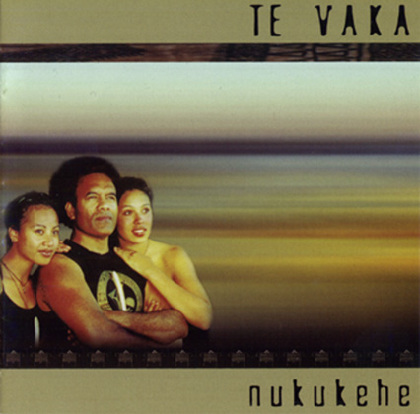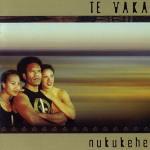
Songs
- artist:Te Vaka
- featured artist:Opetaia Foa'i and Te Vaka
- region:Polynesia
- release year:2002
- style(s):Fusion, Polynesia
- country:New Zealand
- formats:CD (Compact Disc)
- record posted by:Te Vaka Management
- label:Warm Earth Records
- publisher:Spirit of Play Productions Pty Ltd
- buy this record
Links
Nukukehe is the 3rd Te Vaka album.
REAL GROOVE October 2002 Review by Chris Bourke
It’s very simple. Every time I hear a song from Te Vaka it puts a smile on my face and the melody stays with me for days. What else do you want from pop? But the sound of Te Vaka does so much more. These voices, acoustic guitars and drums speak volumes, they stimulate so many emotions: pride, sense of place and belonging, joy and nostalgia. There are plenty of hipper groups successfully fusing their culture with the music industry’s latest push, but the purity of Te Vaka’s approach makes them that much more effecting. Here is the sound of the Pacific, and style Pasifika, with no marketing, merchandising, fashion designers, tourist boards or government cultural strategies. And Te Vaka’s music is so refreshing and appealing that they have been touring constantly around the world since their first album five years ago.
Thanks to some television airtime, ‘Papa e”, from that self-titled debut, became an underground hit (it deserved to be another ‘Poi e’). It was a Pacific pop tune with an unstoppable melody; traditional but devoid of sunset and ukulele cliches or hip hop affectations. The same strengths are present throughout Nukukehe, Te Vaka’s third album. Once again leader and songwriter Opetaia Foa’i has written songs with contagious melodies, spirited vocals and irresistible rhythms. And if you’re wondering what those songs you are singing along to are actually about, it is the issues crucial to the Pacific’s survival: climate change, family and leadership, homesickness and dislocation. ‘Nukukehe’ about the changes back home has the immediacy of ‘Papa e’; ‘Alamagoto’ celebrates the new life while still hearing the call home; and the gentle and moving ballad, ‘Loimata E Maligi’, pays tribute to the 19 Tuvalu girls lost in a school fire. The instruments are voice, guitars, log drums and also keyboards. Te Vaka may be pure but they’re not fusty ethnomusicologists. ‘Tamatoa’ has a synth riff that could come from blondie’s heyday, and ‘Tesema’ also evokes the mirror balled dancefloor. ‘Pukepuke Te Pate’ and ‘Sapasui’ are log-drum instrumentals that emphasise the timeless impact of rhythm - and the communication and emotions achieved when humans are creating the rhythms.
The is plenty of lip service paid to Pacific culture but Foa’i’s Te Vaka is the real oil: this is the canoe undertaking the great migration. To be moved by something so familiar, so pervasive it is taken for granted, is like rediscovering your own heartbeat.


